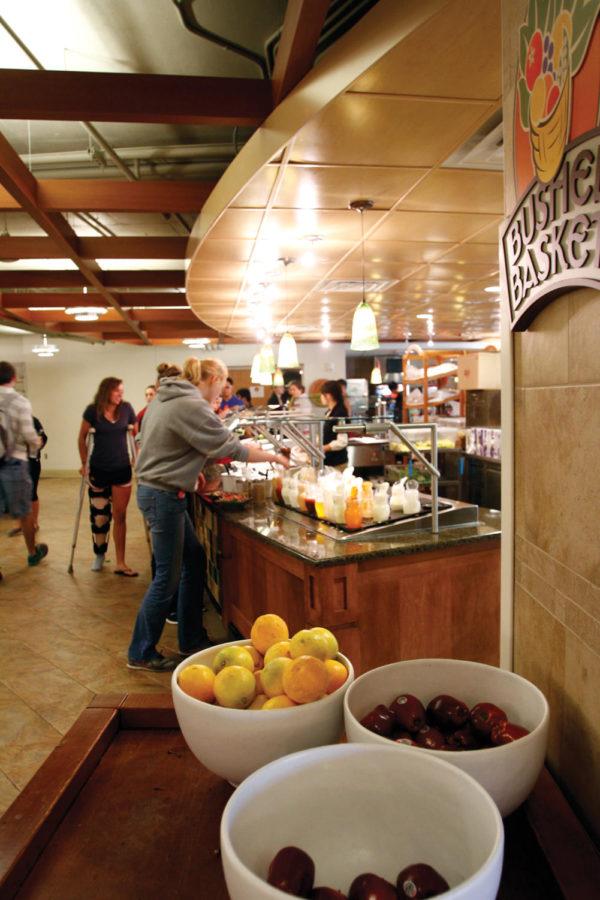Dietitian on campus works to help boost healthy eating
Photo: Megan Wolff/Iowa State Daily
Students visit the salad bar at Season’s Marketplace on Sept. 17.
December 28, 2012
Not everyone can afford not to think twice about what to eat for their three square meals a day. Students who know they have special diet needs due to a chronic illness can use the “special diet needs” service offered by ISU Dining.
“ISU Dining offers assistance to those students on meal plans with special dietary needs, including students with celiac disease, food allergies and other specialized diets prescribed by a doctor,” said Jennifer Ross, manager of foods service.
ISU Dining can help students at the dining center to know what they can and cannot eat due to their specific needs.
“We work with students with special dietary needs, so most of what we do involves making sure students have access to and can easily identify the food and beverage options that will work in their diet,” Ross said.
Ross gave an example of working with a student with a gluten allergy to find dining options. Celiac disease is a gluten allergy which is found commonly in breads and grain-based products.
“If we’re working with a student with celiac disease, we work with the student on a continual basis to make sure they are aware of the gluten-free options that we have available,” Ross said. “In the event that the options are too limited, we may even help the student by preparing a special gluten-free side or entrée to make sure they have food they can eat on campus during a particular meal.”
As long as the students already know what they should and should not eat, ISU Dining can help them find foods in the dining centers that meet their needs.
“Typically, students with special diets know what they can and cannot eat and they’ll inform us of any allergies or other dietary needs that were prescribed by their doctor,” Ross said.
However, there are ISU students who might not have special dietary restrictions and many students who just want to know how to eat healthily.
“We’re in the research stage, and we have been looking at it because the history of nutrition services for students,” said Nora Hudson, assistant director of fitness and wellness at ISU Recreation Services.
Hudson is a part of a group of people investigating the need for a dietitian on campus to assist students in healthier eating decisions.
“There used to be a dietitian over at the health center, and they had a small wellness program where they would offer some basic fitness assessments and nutrition — one or two sessions with a nutritionist to help student be directed toward eating healthy,” Hudson said.
ISU Recreation Services has been looking into the idea of a dietitian for students to join the Wellness Suite at State Gym.
“With personal training we are seeing more interest for people to have the resources for a dietitian because there is what we call scope of practice that personal trainers and people can talk about healthy eating guidelines,” Hudson said. “Unless you are a registered dietitian you can’t recommend an eating program or a diet.”
Currently, personal trainers can offer education and resources for students but having a dietitian on staff could help students with other questions and recommendations.
“The more we can compile interest and data the more that helps our case of developing a position and a program,” Hudson said. “Right now, we are looking at what other schools are doing.”
If this idea moves forward, Recreation Services is considering offering one-on-one and group services, as well as nutrition education.
“I think that there are a lot of good things available at Iowa State,” Hudson said. “For us to look at the potential for collaboration is some ideas that we’re throwing around.”
Hudson recognizes the need for individual attention when it comes to nutrition in addition to the importance of good, reliable information getting out to students who need and want it.
“We see so many apps and so many people being bombarded by information and even though there are guidelines, nutrition needs to be very individualized,” Husdon said. “Many people are now having new dietary needs.”
The Wellness Suite at State Gym offers some nutritional advice but there is room for expansion.
“Currently what we’re doing for students if they want [is that] they can come and get a free wellness assessment which has some questions about nutrition,” Hudson said. “You might get a sense of ‘I might need to do some reading on my own,’ it might help identify where you have some weak links in your nutritional knowledge skills.”
Hudson is hoping that this project can move forward soon.
“It is a top priority for us right now,” Hudson said. “I feel very positive about it right now.”
With different departments and areas of Iowa State working together to better the information available to students regarding health and nutrition, the entire campus community could potentially benefit from having a dietitian on campus.
“[ISU Dining will] continue to try to inform students as to how to make healthy choices when eating in our locations,” Ross said. “I think we all have a role in making our campus a healthy, active place to live, work and study.”

















